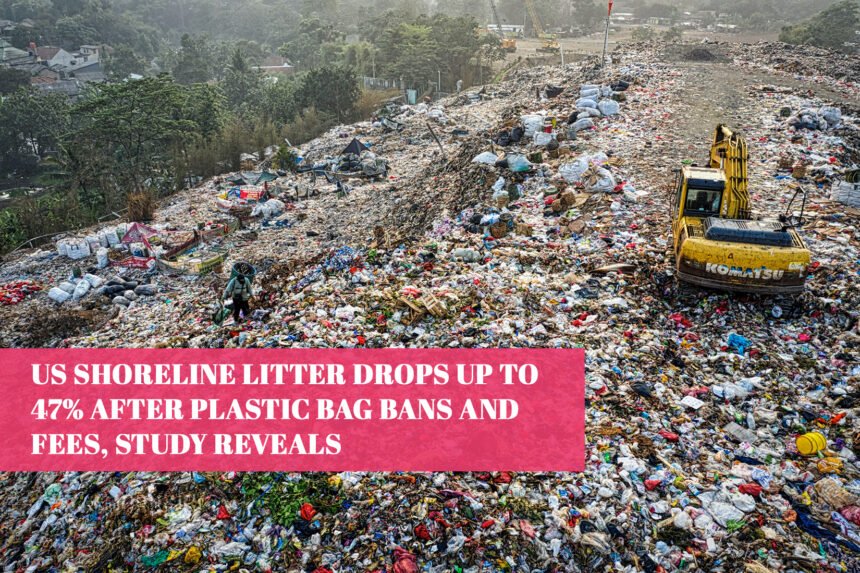Plastic Bag Bans: Banning or charging for plastic bags is proving to be an effective way to keep them off U.S. shorelines, according to recent research on litter across the country. The study, which analyzed data from thousands of cleanup events, found that areas with efforts to reduce plastic bag use saw at least a 25% decrease in the share of bags among the total litter collected, compared to areas without such measures.
The research showed that state-level bans or fees worked better than those put in place by individual towns. These policies had the biggest impact in locations that already struggled with high levels of plastic bag litter. Still, despite these positive results, the overall number of plastic bags found on U.S. beaches and riverbanks is rising, just not as quickly in areas where policies are in place.
How Plastic Bag Policies Differ Across the U.S.
Plastic bag laws in the United States vary from state to state. Some states, counties, and towns have strict bans, while others only ban thinner bags or charge a fee for each bag used. In certain states, local cities and towns aren’t allowed to create their own rules about plastic bags.
To understand how well these rules work, researchers used data from shoreline cleanups that tracked how many plastic bags were picked up compared to other types of litter. Plastic bags accounted for around 4.5% of the total litter picked up, ranking fifth in frequency behind cigarette butts, food wrappers, bottle caps, and plastic beverage bottles.
The research found that places with bag bans or charges saw plastic bag litter decrease by between 25% and 47% compared to locations without such rules. This analysis, which covered 182 different policies and over 45,000 cleanups from 2016 to 2023, is the largest of its kind in the U.S.
Why Some Policies Work Better Than Others
The research found that full bans and fees on plastic bags were more effective than partial bans, which often have loopholes for thicker bags. Laws that cover all types of plastic bags, combined with public education and support for alternatives, tend to reduce bag use the most.

Local and state governments have taken different approaches. Some have banned single-use plastic bags completely, while others require stores to charge for each bag given to customers. These measures not only cut down on plastic waste but also encourage people to bring reusable bags and think more about their plastic use.
Plastic Bag Bans: Global and Local Impact
Plastic bag bans and fees have become more common around the world. More than 100 countries have put rules in place to control plastic bag use, and 175 nations are currently discussing a worldwide agreement to address plastic pollution. In the U.S., more than 500 cities and towns in 28 states have passed laws to limit or ban single-use plastic bags.
The impact of these policies is clear. In some places, like New Jersey, Philadelphia, and Vermont, bans have helped cut single-use plastic bag use by billions each year. For example, after bans were put in place, these areas saw a reduction of about 6 billion bags a year, which is enough to circle the Earth 42 times.
Lessons from the UK
The United Kingdom’s experience shows just how effective plastic bag charges can be. After introducing a small fee on single-use bags in 2015, the UK saw a 98% drop in plastic bag use at major supermarkets. The number of bags found on UK beaches also fell by 80% over the past decade. These results show that even a simple charge can lead to big changes in behavior and help protect the environment.
Remaining Challenges
Even with these rules in place, plastic bags continue to be an issue. The overall amount of plastic pollution is growing, so even though the share of bags in shoreline litter is dropping in regulated areas, the total number of bags is still increasing in many places. Researchers warn that plastic bag bans and fees are just one part of the solution. To really tackle plastic pollution, more action is needed at every stage—from how plastics are made, to how they are used and thrown away.
The Bigger Picture
Plastic bags represent just a small part of the overall plastic pollution problem. They can take hundreds of years to break down and often end up harming wildlife or releasing tiny plastic particles and chemicals into water systems. While bans and fees are helping, experts say that broader solutions are needed, including better recycling, more alternatives to plastic, and global agreements to cut plastic production and waste.
Efforts to ban or charge for plastic bags are making a real difference in reducing litter on U.S. shorelines. State-wide policies and full bans tend to work best, especially in places with serious litter problems. However, plastic pollution overall is still on the rise, so more comprehensive solutions are needed. The experience in the U.S. and other countries like the UK shows that well-designed policies, combined with public awareness, can lead to major improvements in the fight against plastic waste.
MUST READ: Ukraine Destroys Crimean Bridge Support with Underwater Explosion









